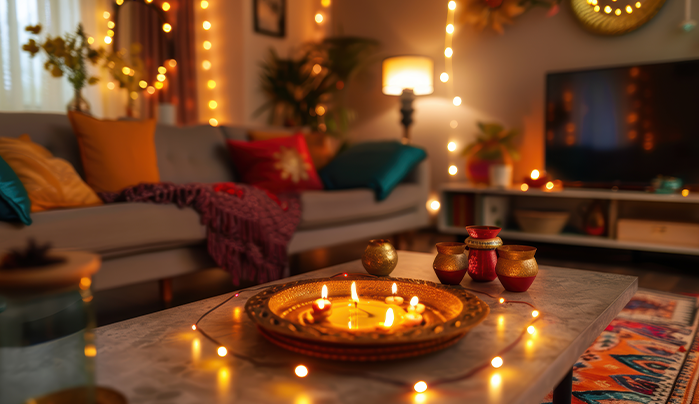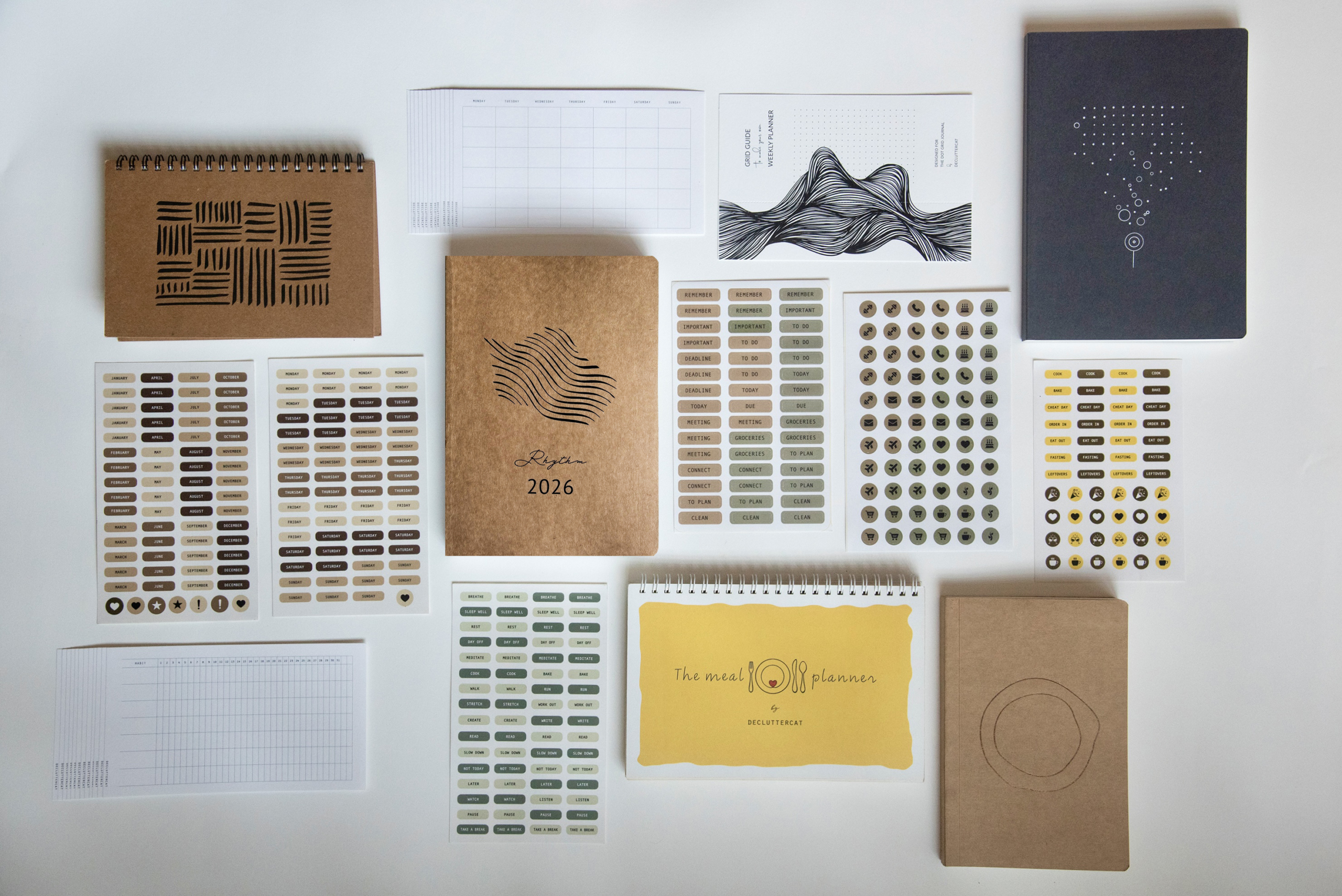Diwali Decluttering: Clearing Space, Calming the Mind, and Finding Your Rhythm
1. The Light Before the Light: Why We Declutter Before Diwali
Every Indian home has its own little ritual before Diwali — cupboards being opened, old newspapers folded for wrapping, the smell of soap and agarbatti drifting through rooms that suddenly feel alive.
It’s not just cleaning. It’s a kind of remembering.
Somehow, this act of clearing space before the lights come on feels both deeply familiar and strangely healing. Maybe it’s because we’ve grown up watching it — parents sorting old things, grandparents airing out trunks, neighbours calling out for spare brooms. Or maybe it’s because deep down, we know this is about more than dust and polish.
Before we invite the light in, we make space for it.
It’s an old rhythm — as old as the festival itself. In stories, it’s said that Goddess Lakshmi visits homes that are calm, ordered, and full of good energy. But maybe what she really loves is intention — the quiet care that says this home is ready for new beginnings.

In a world that moves fast and clutters easily, Diwali offers a moment to reset.
To pause.
To breathe between the lists and lanterns and remember that light — both outside and within — needs space to arrive.
So as you clear the corners of your home this season, think of it as more than a chore.
It’s a gentle way of telling yourself: I’m ready for what’s next.
2. The Psychology of Space and Mind
It’s interesting how our homes reflect our minds, often without us realising.
When things pile up around us — dishes, papers, notifications — our thoughts start to feel the same way: tangled and unfinished.
Researchers have found that clutter can quietly raise our stress levels and lower our ability to focus. The brain reads every visible item as information, even when we’re not consciously noticing it. It’s why walking into a messy room can feel like stepping into a loud conversation.
But there’s another side to this story — the one we’ve always known in some quiet way.
Indian tradition has long tied cleanliness to clarity. Shauch, or purity, is one of the earliest forms of self-discipline mentioned in ancient texts — not as an external display, but as an inner reflection.
A clean space doesn’t just please the eyes; it steadies the heart.
So when we sweep, sort, and rearrange before Diwali, we’re not only preparing our homes — we’re softening the mental noise too.
Sometimes the simple act of folding a stack of clothes or lighting incense in a newly cleaned room can quieten something inside us.
A clear space makes room for calm thought.
And a calm mind makes room for generosity — the kind that shows up in how we give, how we care, and how we show up for the people we love.

3. Clearing Corners, Clearing Stories
There’s always that one drawer we avoid.
The one full of old bills, mismatched cables, a handful of keys we no longer remember. Or the box of clothes we promise to “go through later,” because every piece seems to carry a small story.
Decluttering can be unexpectedly emotional. You pull out an old letter, a photo from a trip, a note scribbled by someone you once knew. You pause.
It’s memory and mess, tangled together.
But maybe that’s the real point of this ritual — to revisit before we release.
To keep what feels like warmth and let go of what feels like weight.
There’s comfort in holding on to a few things — your grandmother’s dupatta, a favourite book with yellowed pages, your child’s first drawing. These are anchors of emotion, and they deserve their place.
But there’s also freedom in knowing when something has served its time.
It’s okay to pass on what no longer fits your life.
Donate it. Repurpose it. Give it another chance to matter to someone else.
Each time you clear a space, notice how it shifts something inside you. That small moment of lightness — it’s not about minimalism; it’s about making space for joy.
You don’t need to do it all at once.
Maybe this week you just open one box. Next week, a shelf.
Make decluttering part of your weekly rhythm.
A Monday wardrobe reset. A Wednesday kitchen shelf clean. A Friday desk tidy-up.
It doesn’t need to be grand — it just needs to be steady.
Because every small clearing, every quiet hour spent putting things back in order, adds up.
Not to perfection, but to peace.
4. The Kitchen as the Heart of Renewal
Every festival begins in the kitchen.
It’s where the sweets are prepared, where the first aroma of ghee and cardamom fills the home.
But it’s also where chaos quietly gathers — too many jars, unused boxes, spice packets long forgotten.
The kitchen mirrors life: busy, generous, and sometimes a little cluttered.
When we take time to clear it out — to wipe jars, label boxes, reorganise shelves — we don’t just make cooking easier; we make space for care.
Because feeding others, or even yourself, feels lighter in a space that breathes.
There’s research to back this too — studies have shown that cluttered kitchens can increase stress and lead to more impulsive choices. An organised kitchen, on the other hand, invites mindful eating and calmer routines.
Meal planning helps here — not as a rigid schedule, but as a rhythm.
A way to reduce that daily question of “what do I make tonight?”
A few minutes of planning can save hours of decision fatigue later.
That’s exactly why we created the Decluttercat Meal Planner — for those who want calm, not control.
It helps you see your week at a glance, plan simple nourishing meals, and still leave space for surprise dinners and sweet experiments.

The act of planning meals — like decluttering — is another way of caring for yourself.
And maybe, as Diwali nears, your kitchen deserves that care too.
5. Mindful Rituals and Protected Pauses
In the middle of all this cleaning and planning, remember to pause.
Decluttering can be strangely emotional — it stirs memories, decisions, little goodbyes.
So, between one shelf and the next, take a moment for yourself.
Stretch your back. Make a cup of chai. Step out onto the balcony.
These little pauses are part of the ritual too.
They remind you that the goal isn’t to finish everything — it’s to feel at ease while doing it.
Every small win matters.
When you finish sorting a cupboard or giving away clothes you no longer wear, take a second to notice how it feels.
That quiet satisfaction is worth celebrating.
Write it down in your planner if you like — “Cleared the old drawer today.”
It doesn’t sound like much, but it’s a way of saying I showed up for myself.
And in between the work and the lists, protect your me-time.
Even fifteen minutes a day.
Light a candle, write a few lines, or simply sit still.
That’s the real meaning of rhythm — not doing everything perfectly, but finding steady pockets of calm in the middle of it all.
6. Gifting Light: The New Luxury
Every year around this time, our phones fill with gift ideas and “festive combo” links. But the best gifts don’t always come wrapped in glitter. Sometimes they come with thought, and space, and quiet meaning.
Gifting, at its heart, is reflection. It’s our way of saying — I noticed you. I thought of what might bring you joy or ease.
Diwali has always been about that kind of giving. The ancient word daan never meant extravagance; it meant sharing light, in whichever form we could.
Maybe this year, that gift is something softer — a planner that encourages slow mornings, a journal that holds your thoughts, a meal planner that helps bring rhythm back to busy days.
Something that says: take care of yourself too.
At Decluttercat, that’s what we try to create — tools that make space.
Space to think. To pause. To plan.
Our planners are designed to feel like breathing room on paper — quiet layouts, minimal art, and plenty of white space for your own thoughts to unfold.
 So when you gift one, it’s not stationery. It’s stillness, gently wrapped.
So when you gift one, it’s not stationery. It’s stillness, gently wrapped.
A way of saying: here’s a little calm for your days ahead.
Because the best kind of luxury isn’t about having more — it’s about having room to be.
7. Minimalism as the Modern Diwali Aesthetic
Somewhere between heavy gift boxes and endless decor, there’s a quiet kind of beauty that’s easy to miss — the beauty of space.
Minimalism doesn’t mean empty. It means intentional.
It means choosing what belongs and letting go of what doesn’t.
In our traditions, simplicity has always been sacred. Lakshmi resides where there’s calm; Ganesha, the remover of obstacles, blesses clarity.
They remind us that abundance isn’t about excess — it’s about alignment.
 A well-set table with just what you love.
A well-set table with just what you love.
A planner with room to write, not rush.
A home that smells of diyas and doesn’t need to be perfect to feel warm.
That’s the new kind of festive luxury — thoughtful, meaningful, calm.
Decluttercat’s minimal aesthetic follows that same idea:
designs that breathe, pages that give you space to create your own flow.
Because white space isn’t empty. It’s invitation.
8. Rhythm, Light, and Letting Go
As the diyas line up on windowsills and homes start to glow, there’s a quiet satisfaction in knowing you’ve made space — in your home, in your thoughts, in your week.
Decluttering isn’t about achieving perfection; it’s about choosing peace.
Every time you clean, plan, pause, or gift with care, you’re not just preparing for a festival — you’re shaping the rhythm of your days.

Diwali reminds us that renewal isn’t loud.
It’s in the gentle act of letting go, in the calm of a swept floor, in a planner page waiting to be filled with what matters most.
So this season, take your time.
Clear a little. Reflect a little. Plan softly.
And when the lights flicker on, may your mind feel just as bright — open, rested, and ready for what’s next.
Because when your home breathes easier, so do you.


